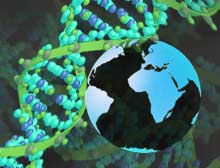
|
URL: http://www.cnn.com/2000/HEALTH/03/14/human.genome03/
Date accessed: 22 April 2001
|
||
WASHINGTON (CNN) -- Scientists around the world should have free access to research on the mapping of human genes, the United States and Britain said in a joint statement released Tuesday. The statement from the two countries comes as international researchers near completion of decoding the DNA within each human cell, a breakthrough that is expected to revolutionize health care.
"To realize full promise of the research, raw fundamental data on the human genome including the human DNA sequence and its variations, should be made freely available to scientists everywhere," U.S. President Bill Clinton and British Prime Minister Tony Blair said in their declaration.
|
||||||||||||||||||||||||||||||||
"We must ensure that the profits of human genome research are measured not in dollars but in the betterment of human life," Clinton said Tuesday afternoon at a White House awards ceremony honoring scientists.
Spreading the results of genetic research is "the right thing to do," Clinton said. Curing and preventing diseases and other uses of human genetics "will be the scientific breakthrough of the century, perhaps of all time," he said.
As for future uses of the knowledge gained through genetic research, Clinton said, "Right now, we’re Benjamin Franklin with electricity and a kite, not Thomas Edison with a usable light bulb."
The human genome is a biological map laying out the exact sequence of the estimated 3.5 billion pairs of chemicals that make up the DNA in each human cell.
Those chemicals are arranged in specific ways to create the estimated 80,000 to 100,000 human genes, which in turn carry the instructions that determine individual characteristics for each person -- the color of eyes or skin, for example.
Genes -- arranged in tightly coiled threads of DNA organized into pairs of chromosomes in most cells of the body -- also determine whether cells will function normally or not.
It's expected that information gathered by genetic researchers will lead to advancements against diseases, especially hereditary ones. Doctors would be able to tailor treatments to a patient's genetic code.
|
||||
Clinton and Blair said they applauded a decision by scientists working on the Human Genome Project to release "raw fundamental information" about the human DNA sequence and its variants rapidly into the public domain. "We commend other scientists around the world to adopt this policy," the statement said.
The United States and the United Kingdom are the leading partners in the project, which expects to complete the first draft of its initial report late this year. There are plans to publish a full genetic map on the Internet by 2003.
In addition to such government-funded gene mapping efforts, private firms also are sequencing human DNA.
But unlike the public endeavor, profit-driven companies are revealing their findings only to those who pay for it.
Private labs also are obtaining patents for their discoveries, a move which protects their expensive research investment but also raises the ethical issue of who owns the components of the human body.
In their statement, Clinton and Blair urged unencumbered access to information on the human genome, saying it would "promote discoveries that will reduce the burden of disease, improve health around the world, and enhance the quality of life for all humankind."
Correspondent Eileen O'Connor and Reuters contributed to this report.